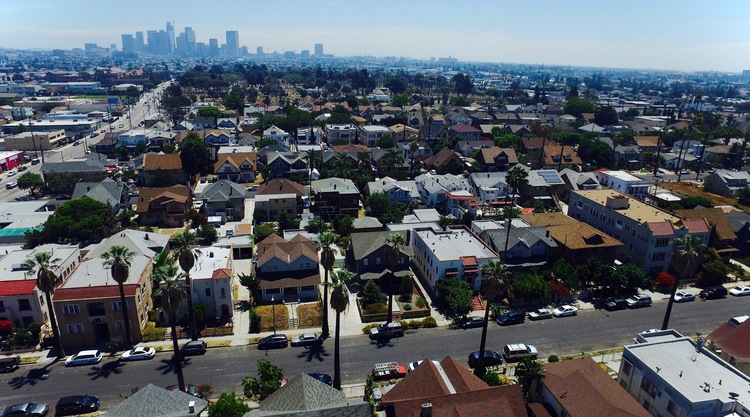
CIM Group is Flipping Los Angeles’ West Adams Neighborhood
October 13, 2022
Gentrification is a nation-wide problem that is only being exacerbated by collaborations between private equity firms and large developers. Through buying large properties, private equity firms push out small businesses and families who have lived in communities for generations. This phenomenon is occurring today in LA’s neighborhood of West Adams, as the private equity firm, the CIM Group, pushes out residents in order to make a profit. While gentrification has existed for decades, CIM Group is also pioneering a new way of gentrification, through attempting to essentially purchase the West Adams neighborhood, with a goal of completely revamping it within a 10-year timeline.
Bloomberg, April, 27, 2022: An Entire Neighborhood Is Being Flipped by a Los Angeles Developer”
This is unfortunately not the first time CIM has engaged in predatory practices to make a profit. In Alexandria, Virginia, tenants of a five-building apartment complex, Southern Towers, find themselves in the midst of an ongoing battle with CIM. Once revered as a stable home for blue-collar workers to raise their families, Southern Towers now finds itself at the mercy of CIM, who acquired the building in 2020. Since then, tenants, particularly those of African descent, have been subject to mass eviction filings during the eviction moratorium; unaddressed mold issues; hostile treatment; and significant rent hikes that make living at Southern Towers no longer a viable option.
As one of the oldest neighborhoods in Los Angeles, West Adams has a rich and complicated history. Most of its buildings were built between 1880 and 1925, making it known for beautiful historic properties. For 30 years, the West Adams Heritage Association has been working to preserve historic homes and buildings within the neighborhood. Once one of the richest parts of Los Angeles, the city saw large amounts of displacement of Black residents when in 1961 the ten-lane Santa Monica Freeway was constructed. In 1965, it experienced the impacts of the Watts Rebellion, a series of riots that took place after the racist arrest of a Black man, Marquette Frye. In 1992, West Adams was the location of several Rodney King riots, which led to the destruction of several local small businesses. This put the small strip of land on the map as another city struggling with issues of race-relations, policing, and class.
Residents re-built, creating a vibrant neighborhood that is home to several schools, shops, and community groups such as the West Adams Neighborhood Association. The neighborhood also is home to a diverse group of residents, with the majority of residents being Latino or Black. The uniqueness of this neighborhood, along with the character and community that has been built is being threatened by the CIM Group.
CIM group is a Los Angeles-based private equity firm founded in 1994 by Shaul Kuba, Richard Ressler, and Avi Shemesh. As of 2022, the firm owns $29.7 billion worth of property. Shaul Kuba calls his work in West Adams “merchandising,” and is working to develop 40+ new properties.” These properties include a $200 a night hotel, restaurants, and storefronts. Real estate website The Real Deal called CIM’s redeveloped properties “hipster bait – industrial spaces reconfigured to lure affluent tech and entertainment professionals.”
CIM Group is responsible for the creation of restaurants such as Alta Adams, a “soul food” restaurant that charges $28 for six chicken wings. Alta Adam’s exorbitant prices are just one example of why people who have built their life in West Adams can no longer afford to live there.
Shaul Kuba has been engaged in an ongoing battle with Abdul Jamal Sheriff, who owns a liquor store in West Adams. Kuba approached Sheriff with interest in purchasing his store. Sheriff alleges that when he did not bend to Kuba’s demands, CIM used the City Attorney office to charge the liquor store with “nuisance” violations, allegations that CIM denies.
CIM group also pushed out Wallace Rowles Jr., a disabled veteran. CIM offered him $9,000 to move out. “They said if I didn’t take it, they’d evict me,” Rowles said. Rowles reported that he is now living out of his car.
It is common for Shaul Kuba to drive through the neighborhood and scope out his next purchase. In fact, when speaking about the demolition of the historic neighborhood, Kuba says “The reuse of some of these buildings makes it very romantic and sexy,” he says. “People just want to be part of it.”
